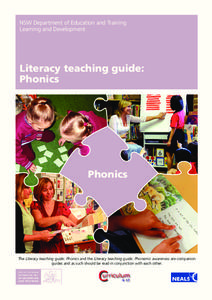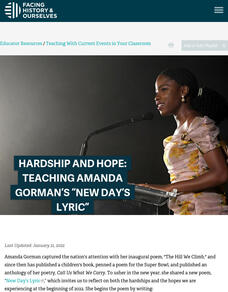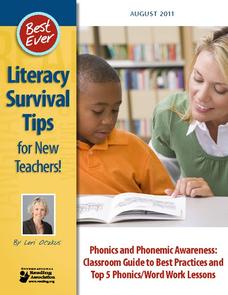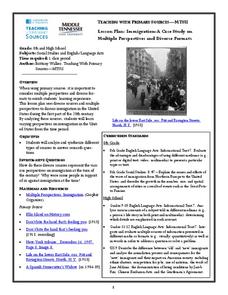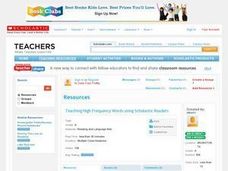Facing History and Ourselves
Fishbowl Discussion
Filter young teenagers' opinions and perspectives with a classic fishbowl discussion. Given any topic relevant to your curriculum, a group of class members engage in discussion for their peers to observe.
University of Pennsylvania
Using Political Postcards to Teach a Revolution of Political Thought
Discuss how political postcards affected everyday people's thoughts and beliefs. Pupils continue a unit on the Dreyfus Affair as they engage in class discussion, watch a video, view a PowerPoint presentation, and fill out worksheets to...
Vanderbilt University
Literacy Teaching Guide: Phonics
You don't have to be a teacher in New South Wales to appreciate this phonics teaching guide. The 73-page packet is packed with information about the principles of effective phonics programs, teaching methods, sequencing, key strategies,...
Illinois State Board of Education
Common Core Teaching and Learning Strategies
Here's a resource that deserves a place in your curriculum library, whether or not your school has adopted the Common Core. Designed for middle and high school language arts classes, the packet is packed with teaching tips, materials,...
Curated OER
Helping Others
Teach the skills, phrases, and responses necessary to help another person. Your autistic learner will practice specific phrases and responses in simulated situations where an adult or peer needs assistance. The exercise includes helpful...
University of Pennsylvania
Using Comic Strips to Teach Multiple Perspectives
Scholars view comics from two different perspectives; one paints the Alfred Dreyfus as innocent, while the other portrays the exact opposite. They solve the mystery of what happened by analyzing the source, working in groups, and...
Digital Public Library of America
Teaching Guide: Exploring To Kill a Mockingbird
Harper Lee's To Kill a Mockingbird, considered by many to be a seminal piece of American literature, contains many complex literary themes that carry through United States history. Use a series of discussion questions and classroom...
Facing History and Ourselves
Hardship and Hope: Teaching Amanda Gorman's "New Day's Lyric"
Class members come together to study Amanda Gorman's poem "New Day's Lyric." After a close reading of the poem, learners watch a video of Gorman reading her poem, and then craft additional lines for the poem where they offer suggestions...
Facing History and Ourselves
Decision-Making: Introduction to the Unit
Make your classroom a supportive and communicative place to be before beginning a unit on the Holocaust. Working together as a class, learners reflect on their previous experiences of classroom discussions before establishing a...
Digital Public Library of America
Teaching Guide: Exploring Little Women
Louisa May Alcott's Little Women is a literary masterpiece as well as a timestamp of the formative mid-nineteenth century in America. Using a primary source set of photographs, letters, and portraits, readers discuss the ways...
Digital Writing and Research Lab's – Lesson Plans
Teaching Close Reading through Short Composition/Revision
This activity may have writers evaluate short compositions, but their subjects are quite tall: great Americans. Pupils read one another's compositions and closely examine how specific phrases and diction contribute to shaping American...
Skills USA
Personal Growth and the Personal Leadership Inventory
What are employers looking for in prospective employees? Career-minded high schoolers examine their strongest technical skills as well as important 21st century skills, including leadership, empathy, clear communication, working well...
International Reading Association
Literacy Survival Tips for New Teachers!
Whether new to teaching or a seasoned pro, this 12-page phonics and phonemic awareness guide is a must for your curriculum library. Everything from a summary of research on the topic to exercises and activities is included.
Curated OER
Teaching Controversial Science Issues Through Law Related Education
Discuss the differences in dialogue and debate when considering a controversial topic. Your class can work in small groups to complete a guided discussion of this controversial topic and then participate in a simulation of the Scopes...
Middle Tennessee State University
Lesson Plan: Immigration: A Case Study on Multiple Perspectives and Diverse Formats
As part of a case study of U.S. immigration during the first part of the 20th century, class members examine a variety of primary sources that present multiple perspectives of the responses of those in favor of immigration and those...
Facing History and Ourselves
The Challenge of Confirmation Bias
Confirmation bias makes it difficult to overcome our preconceived notions of others. That's the big idea in a lesson plan that teaches learners strategies to recognize and question their biases.
Curated OER
Context Skills
Here is a fine lesson on teaching ways to use context clues. Upper graders split up into groups and use sticky notes to cover up five words in a passage of text. The passages are rotated to the other groups, and learners must use their...
Scholastic
Dear Miss Breed
This compelling plan based on the letters in the book Dear Miss Breed engages readers in learning what it was like for Japanese Americans following the attacks at Pearl Harbor. After reading the letters, young scholars will partake in...
Curated OER
Teaching High Frequency Words
Study high frequency words and illustrate them with young scholars. They will use charts to practice the words. They will also do a picture walk with the book they are reading and use the high frequency words in sentences. In the end,...
Facing History and Ourselves
How Should We Remember?
We must remember the past in order to avoid its mistakes. Young historians analyze the importance of historical remembrance using primary and secondary documents, as well as video clips. They then study the creation of a World War II...
Smithsonian Institution
Conflicting Voices of the Mexican War
Americans wanted to fulfill Manifest Destiny, and this pattern continued with the Mexican War. The resource specifically teaches about the Mexican War through a variety of exercises including a research project, group work, brainstorming...
New York State Education Department
TASC Transition Curriculum: Workshop 3
Teachers turning into students? It's not Freaky Friday! It's a thoughtful workshop that teaches participants how to plan professional development for staff. Third in a 15-part series, the workshop provides a platform for the other...
Middle Tennessee State University
The Invention of the Telephone
All of the people in your class would agree that life would be different without the invention of the telephone! Study Alexander Graham Bell's most famous and influential invention through the primary source document of his sketch of the...
Facing History and Ourselves
Responding to Difference
James Berry's poem, "What Do We Do With a Difference?" launches a lesson plan that asks class members to consider the ways people respond when they encounter someone different from themselves. After analyzing the poem and discussing how...




